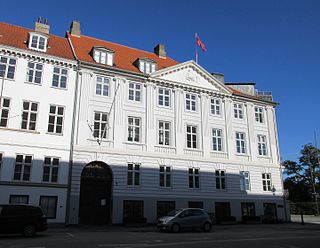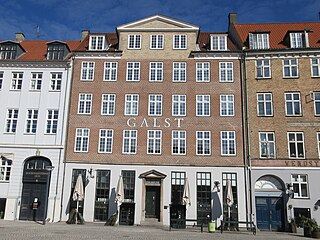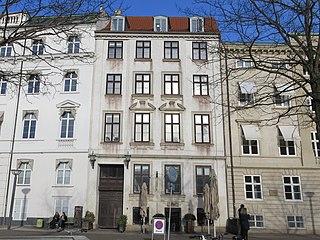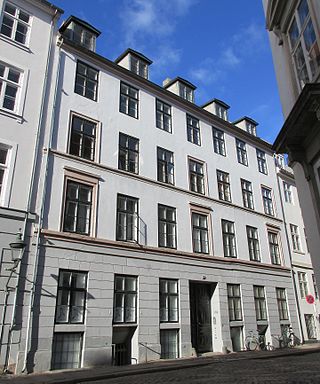
The Gustmeyer House is a historic property on Ved Stranden, opposite Christiansborg Palace on Slotsholmen, in central Copenhagen, Denmark. It was built in 1797 to a Neoclassical design by Johan Martin Quist. The Nobel Prize-winning physicist Niels Bohr was born in the building. McKinsey & Company is now based in the building.

The Sundorph House is a Neoclassical property at Ved Stranden 10 in the Old Town of Copenhagen, Denmark. The property has since the late 17th century been owned by members of the Sundorph family. The current building was constructed for tea merchant Mette Christine Sundorph after the previous building at the site was destroyed in the Copenhagen Fire of 1795. It was listed in the Danish registry of protected buildings and places in 1918.

Amaliegade 14 is a Rococo-style building in the Frederiksstaden neighbourhood of central Copenhagen, Denmark. It was listed on the Danish registry of protected buildings and places in 1918.

Nyhavn 13 is a historic townhouse overlooking the Nyhavn Canal in central Copenhagen, Denmark. With roots dating back to the late 17th century, it owes its current appearance to a heightening of the building with two floors in 1842. Notable former residents include the businessman Abraham Marcus Hirschsprung and the painter and educator Wilhelm Kyhn. The building was listed in the Danish registry of protected buildings and places in 1945.

Nyhavn 35 is a historic townhouse overlooking the Nyhavn Canal in central Copenhagen, Denmark. The building was listed in the Danish registry of protected buildings and places in 1945. Notable former residents include the businessman Jørgen Thomsen Bech and the composer Andreas Peter Berggreen.

Gammel Strand 52/Naboløs 5 is a corner building overlooking Slotsholmens Kanal in central Copenhagen, Denmark. It was listed on the Danish registry of protected buildings and places in 1945.

Gammel Strand 50 is a Neoclassical building overlooking Slotsholmens Kanal in central Copenhagen, Denmark. It was constructed as part of the rebuilding of the city following the Copenhagen Fire of 1795. The building was listed on the Danish registry of protected buildings and places in 1918. Notable former residents include the musician Holger Simon Paulli, chemist Christen Thomsen Barfoed and author Hans Vilhelm Kaalund-

Amaliegade 40, formerly known as Toldbodbørsen, is a Neoclassical property located at the corner of Amaliegade and Esplanaden in the Frederiksstaden district of Copenhagen, Denmark. The shipping company D/S Norden was based in the building for more than one hundred years. It was listed in the Danish registry of protected buildings and places in 1918.

Kronprinsessegade 14 is a Neoclassical property overlooking Rosenborg Castle Garden in central Copenhagen, Denmark.

Gammel Strand 44 is a historic property overlooking Slotsholmens Kanal and Slotsholmen in the Old Town of Copenhagen, Denmark. The building was listed in the Danish registry of protected buildings and places in 1945. Notable former residents include ballet masters Antoine Bournonville and August Bournonville, physicist Hans Christian Ørsted and composer Friedrich Ludwig Æmilius Kunzen.

Ved Stranden 16 is a narrow, mid18th-century property]] located opposite Christiansborg Palace in central Copenhagen, Denmark. The building was listed on the Danish registry of protected buildings and places in 1918. It is flanked by the former Hotel Royal to the left and the Gustmeyer House to the right.

The Obel House is a Neoclassical property located at Vestergade 2 in the Latin Quarter of Copenhagen, Denmark. It was listed on the Danish registry of protected buildings and places in 1918.

Store Kongensgade 79 is a property on Store Kongensgade, opposite Frederik's Church, in central Copenhagen, Denmark. It was listed in the Danish registry of protected buildings and places in 1964.

Nybrogade 24 is an early 19th-century property overlooking the Slotsholmen Canal in central Copenhagen, Denmark. It comprises a four-storey, seven-bays-wide residential building towards the canal and a warehouse at Magstræde 11 on the other side of the block as well as a small courtyard between the two buildings. The entire complex was built in 1815-17 for the wealthy merchant and ship-owner Jørgen Peter Bech, grandfather of the writer Wilhelm Bergsøe who provides an affectionate account of his many visits as a child in his 1898 memoirs De forbistrede drenge. The entire complex was listed in the Danish registry of protected buildings and places in 1918.

Gråbrødretorv 6 is a building at the corner of Gråbrødretorv and Niels Hemmingsens Gade in the Old Town of Copenhagen, Denmark. The oldest parts of the building date from the 1730s but it owes its current appearance to a reconstruction in 1818 and an adaptation undertaken by Valdemar Ingemann in 1881. It was listed in the Danish registry of protected buildings and places in 1945. Former residents include bishop Hans Lassen Martensen and businessman Jacob Heinrich Moresco.

Skindergade 6 is an 18th-century property situated on Skindergade, off the shopping street Købmagergade, in the Old Town of Copenhagen, Denmark. It was listed in the Danish registry of protected buildings and places in 1950. Former residents include the later Governor-General of the Danish West Indies Peter von Scholten, composer Hardenack Otto Conrad Zinck, linguist Rasmus Rask and clockmaker and politician Henrik Kyhl. Skindhuset, a retailer of leather products, is based in the building.

Nyhavn 47 is an 18th-century property situated at the corner of Nyhavn and Toldbodgade in central Copenhagen, Denmark. It owes its current appearance to a renovation undertaken by Julius Andreas Blom in 1842–45. It was listed in the Danish registry of protected buildings and places in 1932. Notable former residents include the merchant and shipowner Peter Christian Knudtzon.

Nyhavn 61 is an 18th-century residential building overlooking the Nyhavn canal in central Copenhagen, Denmark. The building was listed in the Danish registry of protected buildings and places in 1945. The scope of the heritage listing was expanded in 1984. Nyhavn 61 and Nyhavn 59 have now been merged into a single property and are physically integrated on the third floor. The two buildings share a central courtyard.

Admiralgade 22 is a Neoclassical apartment building situated close to Nikolaj Plads in Copenhagen, Denmark. It was constructed in 1845–46 for a wholesale merchant named Harboe for whom Ved Stranden 16 on the other side of the block was also heightened by one storey. The two buildings was at the same time divided into two separate properties. Admiralgade 22 was listed in the Danish registry of protected buildings and places in 1959. The scope of the heritage listing was extended in 1988. Notable former residents include the ballet dancer Adolph Stramboe.

Nyhavn 57 was a late 17th-century building overlooking the Nyhavn Canal in central Copenhagen, Denmark. The property was listed in the Danish registry of protected buildings and places in 1945. Notable former residents include the artist Heinrich Gustav Ferdinand Holm, Hedeselskabet co-founder Niels Georg Christian Morville and D/S Norden-founder Mads Christian Holm.


























